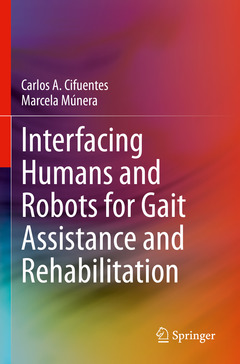Interfacing Humans and Robots for Gait Assistance and Rehabilitation, 1st ed. 2022

The concepts represented in this textbook are explored for the first time in assistive and rehabilitation robotics, which is the combination of physical, cognitive, and social human-robot interaction to empower gait rehabilitation and assist human mobility. The aim is to consolidate the methodologies, modules, and technologies implemented in lower-limb exoskeletons, smart walkers, and social robots when human gait assistance and rehabilitation are the primary targets.
This book presents the combination of emergent technologies in healthcare applications and robotics science, such as soft robotics, force control, novel sensing methods, brain-computer interfaces, serious games, automatic learning, and motion planning. From the clinical perspective, case studies are presented for testing and evaluating how those robots interact with humans, analyzing acceptance, perception, biomechanics factors, and physiological mechanisms of recovery during the robotic assistance or therapy.
Interfacing Humans and Robots for Gait Assistance and Rehabilitation will enable undergraduate and graduate students of biomedical engineering, rehabilitation engineering, robotics, and health sciences to understand the clinical needs, technology, and science of human-robot interaction behind robotic devices for rehabilitation, and the evidence and implications related to the implementation of those devices in actual therapy and daily life applications.
Carlos A. Cifuentes is a Professor with the Department of Biomedical Engineering and Head of the Center for Biomechatronics at the Colombian School of Engineering Julio Garavito (ECIJG). He has been a Visiting Professor at the Federal University of Espirito Santo (UFES, Brazil), the University of Plymouth (the UK), and the EPF Graduate School of Engineering (France). He received his BSc degree in Electronic Engineering from the ECIJG and his M.Sc. degree in Biomedical Engineering from the National University of Entre Rios (Argentina). In 2012, he joined the Robotics and Industrial Automation Group at UFES to pursue his Ph.D. degree. He developed a part of his thesis at the Institute of Automatics at the National University of San Juan (Argentina) and Neural and Cognitive Engineering group, CAR, (UPM-CSIC, Spain). His Ph.D. thesis (2015), for which he received the Honorable Mention Award CAPES as one of the best theses in 2016 in Brazil, focused on developing a multimodal human-robot interface for robotic walkers to assist human mobility and gait rehabilitation. In 2017 his work was lauded as one of “five history-changing ideas in Latin America" by History Channel. In 2020 he was elevated to the grade of IEEE Senior Member. His research on human-robot interaction and rehabilitation robotics are world-leading, and his team’s research has conclusively shown the benefits of using robots in a healthcare context. Funding agencies such as the Royal Academy of Engineering (RAEng. the UK), Ibero-American Programme on Science and Technology for Development (CYTED), and Ministry of Science, Technology, and Innovation (Minciencias, Colombia) present his research as funding successes.
Marcela Múnera received her Ph.D. in Mechanics and Biomechanics from Université de Reims Champagne Ardenne (France) thanks to a FEDER and Region Champagne Ardenne Doctoral Grant. She graduated as a Bioengineer from Universidad de A
Date de parution : 09-2022
Ouvrage de 384 p.
15.5x23.5 cm
Date de parution : 09-2021
Ouvrage de 384 p.
15.5x23.5 cm



